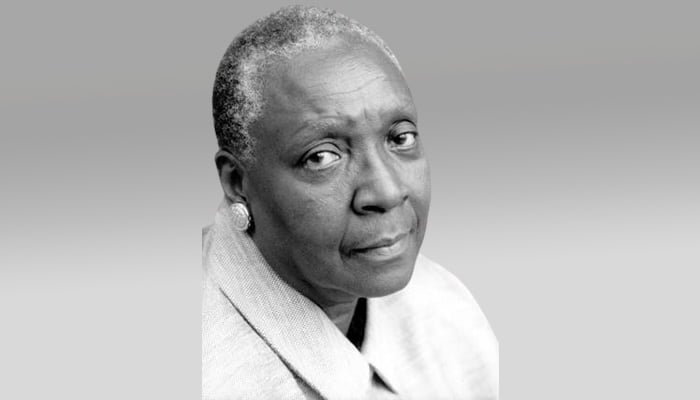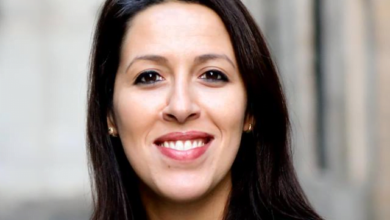Maryse Condé : “Colonization was guilty of quite a few crimes…”
A memory activist, committed against colonialism, Maryse Condé was the first president of the Committee for the Memory of Slavery, replaced by the Foundation for the Memory of Slavery in 2019, and passed away on April 2nd. On the occasion of May 10th, dedicated to the National Day of Remembrance for the Slave Trade, Slavery, and their Abolition, we publish one of her texts, published in 2017 in the Nouvel Obs.

By Maryse Condé
« They throw facts, statistics, lengths of roads, canals, railways at me. Me, I speak of thousands of men sacrificed in the Congo-Ocean. I speak of those who, as I write, are digging by hand the port of Abidjan. I speak of millions of men torn from their gods, from their land, from their habits, from their lives, from dance, from wisdom. I speak of millions of men who have been skillfully instilled with fear, inferiority complex, trembling, kneeling, despair, servility. »
I cannot describe the excitement that these lines caused in me. I was twenty years old. For my birthday, my great friend Françoise, whose father taught history at the Sorbonne, gave me this little red and gold volume entitled « Discourse on Colonialism » published by Présence Africaine in 1950. Who was the author? A Martinican poet named Aimé Césaire.
Although born in Guadeloupe, the neighboring island, while I knew by heart Rimbaud, Apollinaire, Gérard de Nerval, I had never heard of him. Because my mother had put me to sleep by reading Perrault’s tales to me, my hand clasped in Cinderella’s or Sleeping Beauty’s. My father, through a dockside merchant, ordered his crates of champagne from France and the books from the Nelson Library that my brother and I were the only ones to devour. At twelve, I knew everything about Victor Hugo. Given this education, I thought that Blacks grew in the Antilles like guavas grow on guava trees and the fragrant flowers of ylang-ylang on trees of the same name. Natives by birth. I did not know that they had arrived in the Caribbean islands after a painful dispossession.
Does this mean that from then on my life changed radically? « I am a colonized person, » I repeated to myself with intoxication, parading my discovered identity. No, France was not my motherland, my metropolis. My people, who had suffered so much, were victims, and I had to do everything to relieve them. « Discourse on Colonialism » then became my Bible and, without exaggeration, it was partly because of it that I went to Africa.
I will quickly pass over those tumultuous twelve years. I will mention only two events. My sister’s husband was imprisoned for an imaginary plot and died in detention in a prison in Guinea. I myself was imprisoned and expelled from Ghana because I had the misfortune to possess a passport from Guinea, a country where Kwame N’Krumah had taken refuge. To try to understand something about what was happening around me, I immersed myself in the reading of « The Wretched of the Earth » by Frantz Fanon, who with his usual lucidity and humor warned me: « Dreams of possession. All modes of possession: sitting at the colonizer’s table, sleeping in the colonizer’s bed, with his wife if possible. The colonized is envious. »
Was it for this that it was to end?
After this tumult, what would I say today, as an old woman, fleeing the noise of cities, taking refuge in the peace of the Luberon, and simply counting the births of my great-grandchildren. If I remain convinced that colonization was guilty of quite a few crimes, I am nonetheless persuaded that during the regimes that followed under the suns of independence, to borrow the expression of the Ivorian writer, our friend, Ahmadou Kourouma, an equally large number were committed. As in the past, the leaders cared little for the well-being of their people and left them ignorant, hungry, victims of all distress. The flood of migrants pressing at Europe’s doors bears witness to this.
My little Guadeloupe, it did not know independence. In 1946, it changed its baptismal name and remains a French Overseas Department. Alas! It is not well either. Unemployment and all kinds of violence are wreaking havoc there. Places where I used to walk in peace as a child, beaches where I used to swim, have become the scene of the most terrible crimes.
So what to conclude? But precisely, should we conclude? Let’s not conclude. Let’s dream instead, imagine. The history of the world is not over. Already enlightened minds predict the death of the West. A day will come when the earth will be round and men will remember that they are brothers and will be more tolerant. They will no longer fear each other, one because of his religion or the other because of the color of his skin, another because of his speech. That time will come. We must believe in it.






